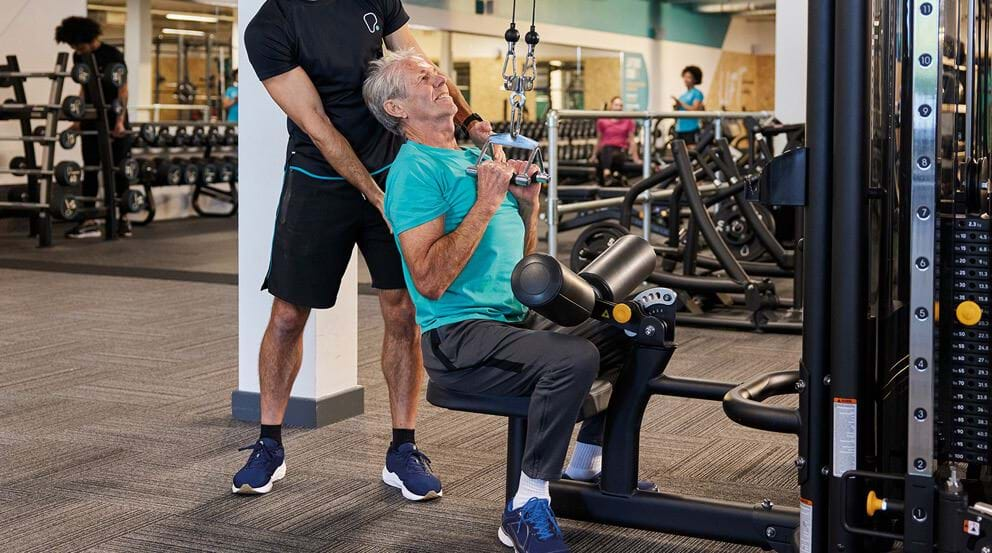How Much Exercise is Too Much? Understanding Your Limits

What Is Overtraining? | Risks | Signs Of Overtraining | How Much Is Too Much | Balancing Recovery | FAQs
It's great to be consistent with your training routine, but is possible to have too much of a good thing when it comes to exercise. Regularly training at a high intensity without adequate recovery can turn into overtraining, especially if this goes on for long periods of time . Whether you're a beginner or used to pushing your limits in the gym, knowing how to balance training and recovery is key to hitting your goals.
In this blog, PureGym Personal Trainer Flyn Woodward explains how much exercise is too much, as well as the signs of overtraining so you can balance training and recovery.
What Is Overtraining?
Overtraining happens when a person does not give their body enough time to recover between workouts, over a prolonged period. This can lead to a variety of physical and mental symptoms, including decreased performance, appetite changes, and fatigue.
According to Flyn, overtraining isn’t just about exercising too much - nutrition, sleep, and stress can impact training and recovery too.
“When a person overtrains, what they're actually doing is under-recovering,” he said. “This happens when training is partnered with poor nutrition - low on protein for recovery, carbs for energy, and enough water. Poor sleep is arguably the most important part of recovery - studies show less than 6 hours sleep can increase risk of injury by 200%. Stress can also have an impact, leading to exhaustion, fatigue, and burnout."
The Risks of Overtraining
People often only realise they are overtraining when their workout performance suffers, but Flyn explains there are other risks too. "Overtraining can lead to fatigue and an increased risk of injury and illness too. As the body starts to feel fatigued, the cells usually used to fend off illness will go toward helping the body recover, and illness like a common cold become more likely"
9 Signs You Might Be Exercising Too Much
Can you exercise too much? For most people, it’s unlikely, however if you are regularly pushing your limits at the gym or in your sports, exercising too much can be a realistic concern.
Get to know the common signs of overdoing it before you slip into overtraining territory. Here’s what to watch out for.
Persistent tiredness, including when you wake up.
Decreased training performance even if effort feels high.
Picking up illnesses and being unable to shake them off.
Mood changes including low mood or irritability.
Muscle or joint pain that doesn’t go away in a couple of days.
Changes in sleeping including less or more than usual.
Decreased appetite or enthusiasm about food.
Elevated resting heart rate.
Irregularities in menstrual cycle and pre-menstrual symptoms.
If you are experiencing multiple of these symptoms, it can be helpful to take a break and then adjust your training to allow for more recovery.
How Much Exercise Is Too Much
By now you’re probably wondering how much exercise is too much exercise. There’s no simple answer, so take factors like your age, fitness level, and overall health into consideration. Here are some good guidelines to start from.
How much exercise is too much for weight loss
Being in a calorie deficit is the most important factor for weight loss, but this can increase the risk of overtraining as you have less calories (energy) for recovery. Aim for a combination of low level cardio, more intense sessions, and strength training, around 5 hours per week.
How much exercise is too much for a woman
Women need to manage their energy output around the menstrual cycle, peri-menopause, and menopause, and some need to consider post-partum. Strength training is important for women, so limit high-intensity workouts to 2-3 times per week and get enough rest.
How much exercise is too much for seniors
Training may need to change as you get older, so focus on 30 minutes of moderate exercise most days of the week, including a combination of strength training, flexibility, and balance exercises.
How many hours of exercise a week is too much?
There might be people in your gym who can handle two hour training sessions or multiple workouts a day, but they’re in the minority. If you’re wondering how much exercise a day is too much, cap training sessions at 90 minutes. If you train 5-6 days a week, think about how much is too much exercise a week – you’ll likely need to do shorter training sessions so you get enough recovery.
Factors That Contribute to Overtraining
Overtraining happens when your training output and recovery input don’t match up. Here are the key things to look out for.
Not enough recovery time between workouts - at least 1-2 rest days a week, with some rest weeks.
Poor nutrition and hydration - your body needs enough calories, all three macronutrients, quality wholefoods, and water.
Lack of sleep - erratic sleep can impact how your body recovers.
High levels of stress - if life is stressful, you will need more rest and recovery.
Sudden increases in training volume or intensity - use progressive overload to build up.
How To Balance Exercise And Recovery
Prevent overtraining by balancing your energy output (training and daily activity) and recovery strategies (nutrition, sleep, water, rest).
- Eat 1.6g-2.2g of protein per 1kg bodyweight per day.
- Drink 1 litre of water per 25kg of bodyweight per day.
- Include carbs in your diet, especially for high intensity sessions.
- Take 1-2 rest days a week (focus on walking and stretching).
- Try to get 7-9 hours good quality sleep a night.
- Don't make every workout high intensity or a 1 rep max PB session.
Deload weeks are a strategy gym goers can use to help stave off overtraining too. Flyn explains "Deload weeks come after a period of high intensity exercise. For example, if you are preparing for an event or competition. For the average gym-goer, you can include them when you feel you need them, or if you know you have social events or holidays coming up. This is a great time to give yourself a mental and physical reset with more food, sleep, and relaxation!"
The Importance Of Rest And Recovery In Your Exercise Routine
When you have big goals, it can be tempting to work out as often as possible to see results. However, the magic of training happens outside the gym, whilst you're sleeping, eating, and resting. Adequate recovery helps gym goers in multiple ways:
- Muscle repair and growth - your body repairs and builds your muscles when you're resting and sleeping.
- Injury prevention - getting enough rest reduces your injury risk on a physical and mental level.
- Mood and mindset - rest days prevent mental burnout and keep you motivated to workout.
- Training performance - proper recovery and nutrition helps you come back stronger each time.
FAQs About Too Much Exercise
Overtraining is a real risk when you try to train harder or more often than your body can recover from.
Signs of overtraining include persistent fatigue, decreased performance, mood changes, and increased susceptibility to illness.
Yes, overtraining can lead to hormonal imbalances that may result in weight gain, and may lead to overeating or appetite dysregulation.
If you're constantly tired, sore, and seeing a decrease in performance, you may be overtraining. If you're not seeing progress despite consistent workouts, you might be undertraining.
Overtraining can weaken your immune system, leading to symptoms similar to a cold or flu.
Overtraining happens when there's too much exercise and not enough recovery. Overtraining and under recovery are two sides of the same coin.
By avoiding overtraining, you'll be able to make more progress in the gym over time. While it's great to work hard for your goals, resting is just as important - if not more!
If you need help with creating a balanced programme, speak to one of our Personal Trainers. Find a PureGym near you to get started.


